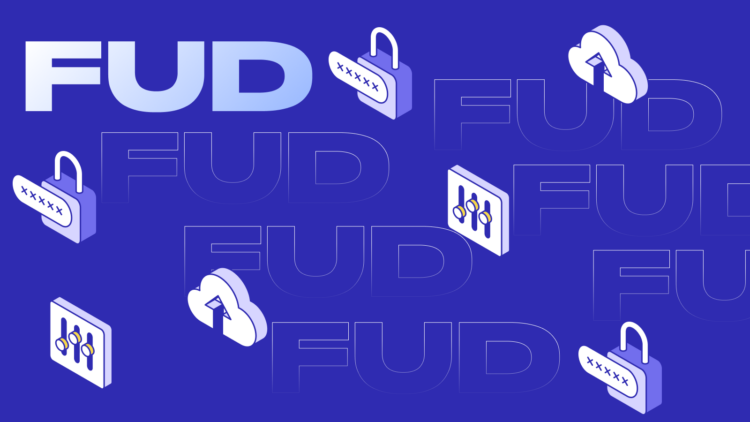In the crypto world, FUD stands for Fear, Uncertainty, and Doubt, a term used to describe negative information or rumours that shake investor confidence and trigger panic-driven decisions. Whether spread intentionally or through genuine concern, FUD has the power to sway markets in minutes.
Crypto markets are especially susceptible to FUD due to their high volatility, 24/7 trading cycles, and still-maturing regulatory frameworks. With billions in market cap often riding on sentiment, even a single tweet or news headline can cause major crypto price manipulation.
Understanding FUD in crypto is crucial because emotions often override logic in trading. Fear can cause investors to sell at the worst times, while uncertainty and doubt may lead to missed opportunities. Let’s discuss FUD more in-depth:
What is FUD in Crypto?
The term FUD originated in the business world as a marketing strategy used to discredit competitors by spreading negative or misleading information. This crypto market manipulation has evolved into a powerful psychological force that can influence prices, investor sentiment, and project reputations within hours.
FUD in crypto works by instilling fear or hesitation among investors, often through speculation, incomplete facts, or emotionally charged messaging. It may be intentional, used to manipulate markets for profit or unintentional, simply the result of panic or misunderstanding. Either way, it creates a ripple effect where people act out of fear rather than rational analysis.
FUD in crypto can take many forms: a misleading tweet from a major influencer, a headline that overstates regulatory risks, or a viral rumour questioning a project’s solvency or security.
In crypto’s fast-moving, sentiment-driven environment, even subtle hints of FUD can lead to massive selloffs or hesitation to invest, making it vital for traders and holders to assess the source and motive behind the noise critically. This is why it is essential to understand the following: what trading psychology is, the mental and emotional factors that influence your decision-making under pressure.
Who Spreads FUD and Why?
This crypto market manipulation doesn’t appear out of nowhere; it’s often pushed by individuals or groups with specific motives, whether intentional or not.
Intentional FUD Spreaders
Some players deliberately spread FUD in crypto to benefit financially or politically.
- Short sellers and market manipulators: These actors profit when prices fall. By spreading fear or uncertainty, they can trigger sell-offs and then buy back assets at lower prices, pocketing the difference.
- Competitors and rival projects: In the race for dominance, some crypto projects may resort to discrediting others to attract users and investors. Smearing a rival through selective facts or rumours can sway public opinion.
- Politicians or regulatory bodies with agendas: Some officials or regulators may use FUD to promote stricter controls or steer the public away from decentralized finance. Messaging that highlights worst-case scenarios can justify their stance or policy goals.
Unintentional Spreaders
Not all FUD in crypto is malicious; much of it comes from people who don’t verify before sharing.
- Influencers repeating unverified news: Influencers often share headlines or leaks without fact-checking. Their large followings amplify the message, giving false or exaggerated claims more reach.
- Panic-driven users in Telegram, Reddit, or X (Twitter): In high-volatility environments, even small bits of misinformation can spark fear. Users might unintentionally share rumours or misinterpret data, fueling panic across communities.
- Sensational media headlines: Mainstream media sometimes chooses drama over accuracy, using charged language that stokes fear rather than informs. This can distort public perception, especially for those unfamiliar with crypto nuances.
Real-World Examples of FUD in Crypto
FUD isn’t just a theory; it has repeatedly influenced crypto markets in very real ways. Here are a few high-impact examples of crypto market manipulation.
China’s Crypto Bans (Repeatedly)
China has issued several bans on crypto trading and mining over the years.
- Market drops after each announcement: Every time China announces new restrictions, whether on exchanges, ICOs, or mining, markets tend to react with sharp, temporary sell-offs, often wiping billions in value.
- How markets often recover after the “news” settles: Despite these announcements, Bitcoin and other major cryptocurrencies have historically rebounded, revealing how recurring FUD can create panic without long-term damage.
Elon Musk’s Bitcoin Energy Tweet (2021)
A single tweet from a high-profile figure showed how quickly sentiment can shift trading psychology.
- Impact on BTC price: When Elon Musk tweeted concerns about Bitcoin’s environmental impact in May 2021 and said Tesla would stop accepting BTC, Bitcoin’s price dropped nearly 15% within 24 hours.
- How public sentiment flipped with a single message: The tweet sparked global debate on Bitcoin’s energy use, causing widespread uncertainty, though later efforts by the Bitcoin mining industry to highlight sustainable practices helped restore some confidence.
Mt. Gox Repayment Rumours
The ghost of Mt. Gox continues to fuel anxiety in crypto circles.
- Speculative FUD about major sell-offs: Rumours that Mt. Gox creditors would dump billions worth of Bitcoin, often leading to panic selling, even when there’s no concrete evidence of immediate sell pressure.
- Separating rumours from actual bankruptcy updates: In most cases, these fears stem from misunderstanding the slow, structured nature of legal repayments, yet they spread quickly, highlighting how easily misinformation triggers fear.
Why FUD Is So Prevalent in Crypto
FUD in crypto thrives because the environment is naturally volatile, fast-moving, and emotionally charged.

- High volatility and speculative behaviour:
Crypto assets often experience double-digit price swings within hours. This makes traders highly sensitive to news, real or fake, and quick to react out of fear or greed.
- Lack of regulation and consistent news sources:
With no centralized regulatory body and a mix of anonymous influencers and biased outlets, misinformation spreads quickly and is rarely fact-checked in real time.
- The role of tribalism between crypto communities:
Competing blockchains or token communities often spread FUD about rivals to promote their own project, fueling hostility and misinformation wars.
- Speed of information flow in the digital age:
Tweets, Reddit posts, and YouTube videos can go viral in minutes, causing panic before facts are verified, making the crypto market especially susceptible to rapid waves of FUD.
How to Spot Baseless FUD vs. Real Concerns
In a space where rumours can cause crypto price manipulation and tank prices overnight, knowing how to separate noise from real news is crucial for your trading psychology.
Common Red Flags of FUD
These signs often indicate an attempt to stir panic rather than present facts:
- Vague or anonymous sources: If a claim starts with “a friend of a developer said” or “rumor has it,” there’s usually no solid ground to stand on.
- Emotional or dramatic language: Words like “scam,” “collapse,” or “crypto is dead” without clear context often signal fearmongering.
- Claims with no data or official links: Legitimate concerns are usually backed by proof. If there’s no evidence or citation, it’s likely just FUD.
Signs of Legitimate Concern
These indicators suggest the news might be real and worth your attention:
- Official statements from known sources: Regulators, blockchain foundations, or company execs making public announcements add credibility.
- Verifiable data (on-chain metrics, filings, etc.): If claims align with blockchain explorers, SEC filings, or audit reports, they hold more weight.
- Consistent reporting across reliable outlets: When multiple respected crypto and financial platforms confirm the same story, it’s more likely to be accurate.
How Traders Can Protect Themselves
In a market where fear spreads faster than facts, protecting yourself from FUD in crypto is just as important as reading charts.

Pause before reacting emotionally
When you see negative news or a sudden crypto price manipulation, your first instinct might be to sell or panic. But emotional responses often lead to poor decisions in crypto. Take a breath, step back, and avoid reacting instantly. Give yourself time to verify the facts and assess whether the situation actually threatens your position or if it’s just market noise.
Cross-check news across multiple sources
Crypto news can originate from anyone, anywhere. One influencer’s tweet isn’t enough. Check if other reputable sources, such as DeFi-Planet, CoinDesk, The Block, or Bloomberg Crypto, are reporting the same story. If a claim is only circulating in a meme account or shady Telegram group, it’s likely unreliable. Trust, but verify.
Use tools like on-chain data platforms and news aggregators
Don’t just rely on headlines, go deeper. On-chain analytics platforms like Nansen, Dune, and Glassnode provide actual blockchain data that shows what’s happening behind the scenes: wallet movements, exchange flows, and whale activity.
News aggregators like CryptoPanic or CoinMarketCap also help you track credible news from multiple sources and filter signals from noise.
Stick to a trading/investment strategy instead of chasing headlines
Having a clear strategy and trading psychology and an understanding of how to master trading psychology, whether it’s HODLing, swing trading, or dollar-cost averaging, can protect you from making knee-jerk decisions during volatile moments. Reacting to every tweet or FUD wave is not a strategy. Discipline and consistency often outperform short-term emotional trades, especially in high-volatility environments like crypto.
Follow credible analysts and filter your feed
Social media plays a huge role in spreading both real news and FUD in crypto. That’s why curating your information sources is crucial. Follow developers, blockchain researchers, and market analysts who base their insights on data, not hype. Unfollow or mute accounts known for spreading drama, vague predictions, or low-quality content.
ALSO READ: How to Effectively Beat the FUD Factor in Crypto Markets
Conclusion: Will FUD Always Exist?
FUD isn’t just a passing trend in crypto; it’s part of the environment. From regulatory whispers to social media drama, traders will always face waves of fear, uncertainty, and doubt. The key is not avoiding FUD in crypto entirely, but learning to recognize it as part of the market’s emotional cycle.
The smartest crypto traders don’t react impulsively. Instead, they pause, investigate, and verify before making moves. They understand that not all negative news is trustworthy, and even when it is, it doesn’t always warrant a panic sell. Developing this critical thinking mindset is essential for long-term success in crypto.
In the end, FUD is just noise, unless you let it control your decisions. Stay grounded by sticking to your strategy, using reliable data, and keeping your emotions in check. Crypto will always have ups and downs, but with the right approach, you can navigate the market without being shaken by every rumour.
Disclaimer: This article is intended solely for informational purposes and should not be considered trading or investment advice. Nothing herein should be construed as financial, legal, or tax advice. Trading or investing in cryptocurrencies carries a considerable risk of financial loss. Always conduct due diligence.
If you would like to read more articles like this, visit DeFi Planet and follow us on Twitter, LinkedIn, Facebook, Instagram, and CoinMarketCap Community.
Take control of your crypto portfolio with MARKETS PRO, DeFi Planet’s suite of analytics tools.”





















